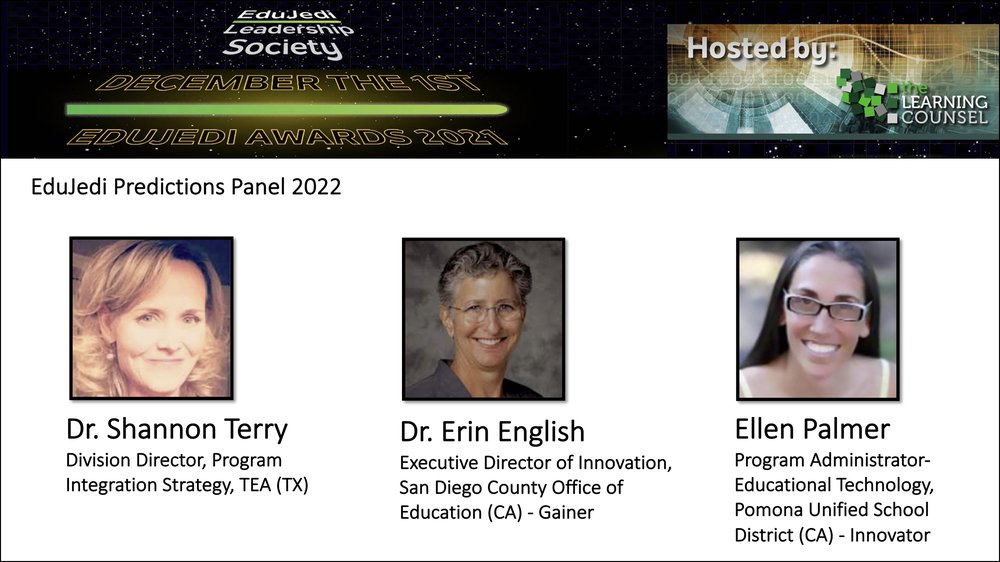This EduJedi predictions panel is made up of some of the greatest minds in education, as well as long-time friends of the Learning Counsel. Included on the panel are Dr. Shannon Terry, Division Director, Program Integration Strategy at the Texas Education Agency (TEA), Dr. Erin English, Executive Director of Innovation, at the San Diego County Office of Education (an EduJedi Gainer) and Ellen Palmer, Program Administrator-Educational Technology at Pomona Unified School District (an EduJedi Innovator).
According to Dr. Shannon Terry, “As we transition through these after-COVID ripple effects, if you will, in Texas we were all hands-on deck in terms of redeploying assets to be able to implement high quality instructional materials across the state of Texas through a variety of instructional designs and through a variety of platforms. We are all familiar with the asynchronous synchronous blended models that are available, and we know that students were learning in the home. And so, we really made a concerted effort to ensure our local education agency school districts had digital access that included connectivity and included the employment of devices we supported through a robust system of supports including universal grants that allowed for decisions to be reached that aligned with the local education agency needs, from instituting tutoring programs, and enhanced supports to students in terms of intervention.
“Certainly, a very important piece that was threaded throughout those wins was the emphasis and priority assigned to professional learning. We know that our teachers and educators system leaders were all at different points in the continuum in terms of familiarity with comfort, and adoption of support for digital learning. So, we really had some growing pains there. And then also to your point, Leilani, we had many, many wins. So, check out the Texas Education Agency website to see some of those. And, uh, since we're all in this together, maybe borrow some resources to impact students more broadly.”
Panel moderator LeiLani Cauthen, CEO of the Learning Counsel, asked “Maybe one of the largest inequities ever is the system itself, how it's structured to normalize and everyone's supposed to join us in kindergarten and has to do this and stay with the pack in every subject, in their whole journey for 13 years, the same as everyone that are the same ages. It's falsely and maybe systemically created inequity. It all boils down to time and space changed and exposed a systemic inequity that we've lived with, that we struggled our way out of and poked our head above. It's really not ever going to be normal anymore. So, I'd like you guys to comment on that issue of normal's gone and there's a rift that's pretty permanent. And what are your thought patterns going forward? And this is where I'm really gonna have you drill down into what are you really think?”
According to Dr. English, “I was a former board member and in a district. And what I see is there's such a clash in educators, parents, board members, administrators. We're not all clashing, but we all have our beliefs of what education could be and should be. And they're coming in thinking, ‘Hey, I'm a doctor or I'm a lawyer or I'm doing this or I'm doing that. And it served me well, therefore it's gonna serve my kids well, because they're gonna be successful like me. So we can't change anything. They don't realize that our system was set up to make really good factory workers. We learned that chat. We learn how to recite that poem and we learn how to copy that paragraph and put it in that box. We're great at what we do, but we're seeing now that the workforce does not have the critical thinkers or colleges don't have the critical thinkers we need. And the entry level positions now are having to reteach and train people. So, to answer your question in a long way, I see the pushback as coming from businesses and people that are hiring are will say say you're not sending us people that we can hire anymore. We can't keep training them. You're sending us to college, but they must take math over again. They have to take five years of math because they couldn't get it in the fourth grade.”
According to Ellen Palmer, “My first thought is, people are sure fighting hard to make it come back. mm-hmm right. They want to revert back, and now you're seeing teachers like, ‘oh, let's just do worksheets.’ You can pivot back a little bit, but don't pivot back all the way. I know that within our district, the systems and structures, it's going to be a long time before we’ll see true transfer of information from that. And so our work will continue to be grassroots. I once went to a professional learning opportunity, and we had to come up with an image that we felt represented our district. And I feel like our district is a floating city. It is an aircraft carrier. And if you know anything about aircraft carriers, you know, that it takes, them two miles to start to slow down before they can start to pivot. And that's kind of how I see our system.”
Shannon Terry added, “Makes sense. I'll start with the quote that comes from a group called KnowledgeWorks, and it says “The future’s not a fixed point because it underscores what we've been talking about, that it's ours to create. And you alluded to this, that the crisis point in our education is not one of teacher or school performance, but it's about the system.”
The panel continues, wide open, with no-holds barred. Hear their wisdom, opinions and predictions for the future. This video is tons of fun and offers so much to learn and use back home in your own district.











